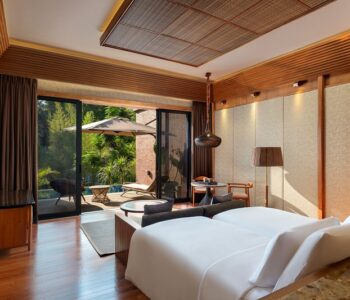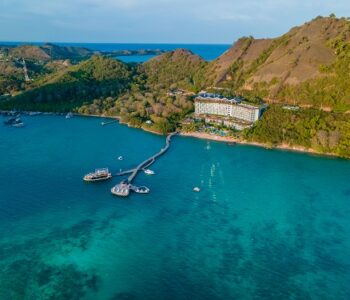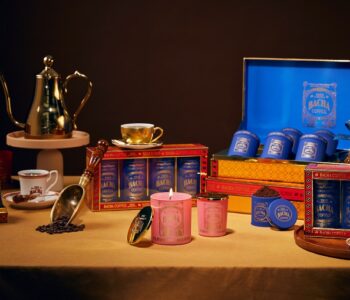Jakarta is a fusion of rich ethnic diversity from across the archipelago, merging local Indonesian distinctions with international cultures and ideas. At the grassroots levels, there is a flourishing creative community, with abundant human potential, a dynamic and evolving infrastructure, and increasingly diverse opportunities.

A healthy art and creative scene is essential to any modern megacity and the well-being and intellectual prowess of the nation. Some of the most valuable organisations develop from the ground up, their foundations in the emerging generations who are proactive, imaginative, resourceful and inspired by solid visions of the future. A unique collective study and contemporary art ecosystem is at the forefront of generating opportunities for Jakarta’s thriving creative community. This collaborative model is known as the Gudskul Ekosistem, or Gudskul for short.
“Our key objective is to spread the spirit of collectivity and cross-disciplinary collaboration in the development of artistic-based work in the arts and cultural sphere,” designer, artist, teacher and member of the Gudskul Program Team, Sigit, told NOW!Jakarta Magazine.
“Gudskul is a joint learning forum for arts and cultural agents wishing to contribute to the local context while being involved in international dialogue. As a space for sharing knowledge, Gudskul is open to artists, art managers, curators, researchers, and cultural practitioners. We prioritise cross-disciplinary work practices, pluralism and openness, a cooperation, the exchange of ideas, experimentation, and independence in cultural arts work in society.”

The Gudskul Ekosistem comprises artists, curators, art writers, managers, researchers, musicians, directors, architects, cooks, designers, fashion designers, street artists and individuals with various expertise. Under the umbrella of Gudskul is an amalgamation of collectives with different practices, such as installation, archive, video, sound, performance, media art, public participation, printmaking, graphic design and education. In-house collaborative projects cross the social, political, cultural, economic, environmental, and educational divides.
“Gudskul evolved through the merging of ruangrupa, Serrum and Grafis Huru Hara. ruangrupa is a not-for-profit artists’ initiative established in 2000 to support the progress of art ideas within the urban context. It uses exhibitions, festivals, art labs, workshops, research, and journal publications. ruangrupa recently received global attention in their role as curators of the German international art event Documenta 15 in 2022. Serrum was founded in 2006 and focuses on fine arts studies and education. Grafis Huru Hara is a graphic art collective established in 2012 dedicated to exploration, experimentation and print media education,” Sigit said. “Their collective core values emphasise equality, sharing, solidarity, friendship and togetherness.”
Developed from a not-for-profit model, Gudskul’s funding is generated by donations from the collective’s members, institutions, and sponsors and the Gudskul business component Rux, an art, curatorial, editorial, visual, product, promotional and identity design company. The collective shares pooled assets collected by the group, such as money, books, equipment and programs. Gudside is a studio complex for artists, designers, architects, and other creative workers within the Gudskul Ecosystem for paid and unpaid activities; all are published on the website. Gudskul’s array of internship programs is open to the public, SMA/SMK or equivalent, and students.

Investing in the well-being of future generations is a significant aspect of the Gudskul ekosistem. Ruru Kids is a fun, instructive, and innovative education-based art program for children and adolescents that utilizes art workshops, music, and video performances.
Rurukids invites artists, art practitioners, and interdisciplinary professionals to share their knowledge and experience while encouraging the development of children’s self-esteem, self-expression, and critical thinking abilities. This enables them to share knowledge with their peers, assist the participants in learning and playing, and cultivate them into works of art.
‘Jakarta 32°C’ is a college students’ dialogue and networking contemporary art and culture forum. Initiated in 2004, Jakarta 32°C collect students’ ideas and experiments and examines the latest campus issues through exhibitions, discussions and writing. Some of the programs are Bicara Tugas Akhir, an archiving platform and Sinema Kolekan, a student film screening and periodical radio, Seni Kebut Semalam. Karbon is a digital journal focusing on the problems of national public space and urban visual culture from critical, creative and imaginative angles. (www.jurnalkarbon.net)
Dedicated to intercultural exchange, Gudskul’s recent events and upcoming programs culminate in international collaborations. GUDSKUL STUDI KOLEKTIF 6 2024 “Praktik Lumbung,” an open call that closed in February, reached out to collectives in Indonesia who wish to join the 2024 Gudskul Collective Study. Six selected collectives, with two representatives per collective, will participate in a program from September 2024 to September 2026, consisting of joint classes, art residencies, research, interregional visits, collaborative projects, and festivals.

The program features on- and offline learning in curatorial practices, fundraising, collective aesthetics and institution management, and program and economic sustainability strategy development. Its format integrates with de Appel’s Curatorial Program (Amsterdam) and Sandberg Institute Temporary program: Lumbung Practice (Amsterdam).
The 2024 Gudskul Batch 6 programme is overflowing opportunities, to learn more go to: www.gudskul.art or follow them on Instagram @gudskul





